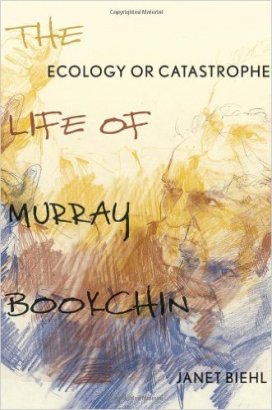Institute for Anarchist Studies

Murray Bookchin was a pivotal, polarizing figure in the post-WWII history of anarchism. He put ecology and democracy on the anarchist agenda in a way that was as novel as it is enduring.
As a polemicist, he spent decades at the center of crucial debates about history, strategy, and foundational ideals. Even his critics must acknowledge that he made major contributions to the growth and clarification of the anarchist perspective.
Something shifted in the movement when he died in 2006. For the preceding fifty years, his writings had been a point of reference through which we could clarify our views, even when we disagreed with them, whereas now that he was gone we had to make sense of him. Who was he and how had he lived? These are compelling questions for those who had worked with him and for anyone who wants to understand contemporary anarchism.
Janet Biehl’s Ecology or Catastrophe: The Life of Murray Bookchin (Oxford University Press, 2015) will help us here. The first (and probably last) biography of Bookchin, it is well-written, exhaustively documented, and invites readers to traverse the full arc of his life, from his earliest days in New York City to his last in Burlington, Vermont. But it is more than a biography. Biehl was Bookchin’s lover, collaborator, editor, researcher, advocate, and (finally) nurse for two decades and this text is also a memoir of their time together.
Ecology or Catastrophe tells a tragic story. Biehl portrays Bookchin as an irrepressible, profoundly creative and intelligent man who threw himself wholly into radical movements, set out to untangle some of history’s most challenging problems, but who ended his days feeling isolated, abandoned, and despairing.
Biehl narrates his life through his participation in the revolutionary Left—swinging back and forth from a depiction of the Left broadly to his response to it. His political history begins in New York City in 1930 when the precocious nine-year-old Bookchin joined a Communist Party youth group. The international communist movement was very much a mass, revolutionary movement at the time and his experience within it left a permanent imprint upon his political identity. It was emotionally important for him too. Biehl says that the Communists helped him compensate for his dysfunctional family (a physically absent father and emotionally absent mother). They “rescued Murray,” she says, “by becoming his surrogate parents. . . . They educated him . . . [and] provided him with stability and validation.”(7)
Succeeding chapters chart Bookchin’s path through many of the most utopian and radical currents in the twentieth century Left. We see him working with WII-era communist dissidents (“Rethinker” and “Decentralist); navigating the radical milieu of the 1960s (“Eco-Anarchist” and “Counterculture elder”), and so on. Biehl does a good job at reconstructing his life during the more distant years, where the historical record is incomplete, and at unpacking the often obscure history of the trends around which Bookchin built his life.
Categories: Anarchism/Anti-State, Uncategorized


















I think this is a good example of irreconcilable differences of value. Though I do share an unrelenting pessimism, I otherwise find nothing even interesting in Bookchin. I don’t claim to have read much by him, but everything I have read or heard immediately turned me off. I can not even fathom why anyone would give a shit about equality, democracy, or the short-term viability of an ecosphere which is clearly capable of being technologically replaced if people aren’t being total wankers (and if they are they’ll be too weak to destroy much, so either way…)
This goes for most other contemporary anarchists – I can read Kropotkin and Proudhon without much animus, and frequently agree with them, but when I read Bookchin or Bob Black all I can think is ‘if this is anarchy, I’ll take despotism’.